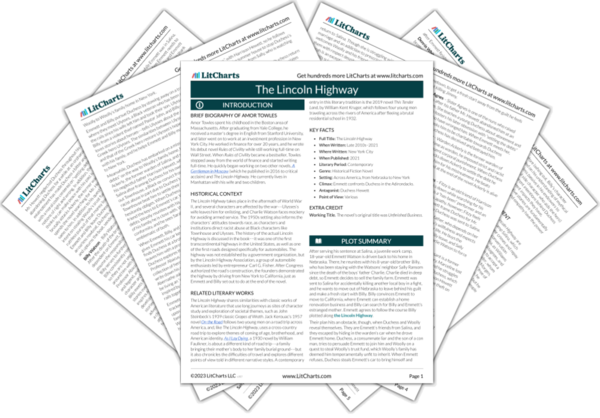Harrison Hewett Quotes in The Lincoln Highway
I felt a surge of tender feelings for the old man in a manner that made my hands sweat. But if the Bible tells us that the sons shall not have to bear the iniquity of the fathers, then it stands to reason that the fathers should not get to bear the innocence of the sons.
So I hit him.
––[…] after fifty-five years in Nebraska, I think I can tell a stayer from a goer.
––Is that so, I said. Then tell me, Mr. Ransom: Which am I?
You should have seen his face when I said that. […]
––I have indulged you in your manner and your habits; indulged you in your temper and your tongue. But Sally, so help me God, I have come to see that I may have done you a terrible disservice. For by giving you full rein, I have allowed you to become a willful young woman, one who is accustomed to nursing her furies and speaking her mind, and who is, in all likelihood, unsuited to matrimony.
[O]f all the boys whom Emmett had known at Salina, he would have ranked Duchess as one of the most likely to bend the rules or the truth in the service of his own convenience. But in the end, Duchess was the one who had been innocent. He was the one who had been sent to Salina having done nothing at all. And he, Emmett Watson, had ended another man’s life.
What right did he have to demand of Duchess that he atone for his sins? What right did he have to demand it of anyone?
Sitting together on a nearby bench were Woolly and Billy, smiling at the floor plan of the house in California. And there was Sally leaning over a pram to tuck in the blanket of the child in her care. And there by the flower cart was Sister Sarah looking wistful and forlorn. And right there, not more than fifty feet away, standing by the door of his bright yellow car, was Emmett, looking honorable and upright.
[…] I could hear the distant chiming of a clock. Only it wasn’t a clock, and it wasn’t distant. It was the gold watch that had been tucked in the pocket of my vest […].

Harrison Hewett Quotes in The Lincoln Highway
I felt a surge of tender feelings for the old man in a manner that made my hands sweat. But if the Bible tells us that the sons shall not have to bear the iniquity of the fathers, then it stands to reason that the fathers should not get to bear the innocence of the sons.
So I hit him.
––[…] after fifty-five years in Nebraska, I think I can tell a stayer from a goer.
––Is that so, I said. Then tell me, Mr. Ransom: Which am I?
You should have seen his face when I said that. […]
––I have indulged you in your manner and your habits; indulged you in your temper and your tongue. But Sally, so help me God, I have come to see that I may have done you a terrible disservice. For by giving you full rein, I have allowed you to become a willful young woman, one who is accustomed to nursing her furies and speaking her mind, and who is, in all likelihood, unsuited to matrimony.
[O]f all the boys whom Emmett had known at Salina, he would have ranked Duchess as one of the most likely to bend the rules or the truth in the service of his own convenience. But in the end, Duchess was the one who had been innocent. He was the one who had been sent to Salina having done nothing at all. And he, Emmett Watson, had ended another man’s life.
What right did he have to demand of Duchess that he atone for his sins? What right did he have to demand it of anyone?
Sitting together on a nearby bench were Woolly and Billy, smiling at the floor plan of the house in California. And there was Sally leaning over a pram to tuck in the blanket of the child in her care. And there by the flower cart was Sister Sarah looking wistful and forlorn. And right there, not more than fifty feet away, standing by the door of his bright yellow car, was Emmett, looking honorable and upright.
[…] I could hear the distant chiming of a clock. Only it wasn’t a clock, and it wasn’t distant. It was the gold watch that had been tucked in the pocket of my vest […].











